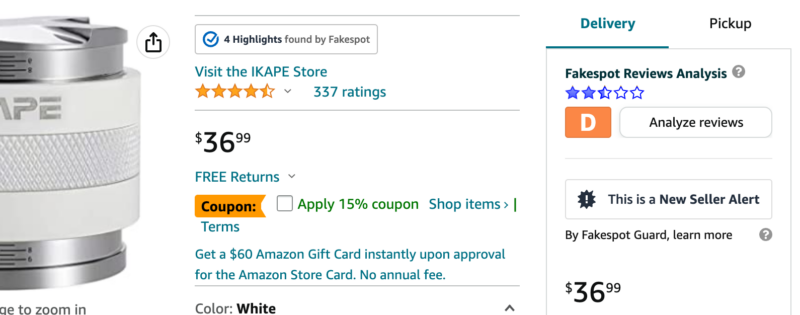
Amazon / Fakespot
Fakespot, a helpful service that explains how products you’ve never heard of can garner 12,000 reviews with an average rating of 4.6 stars. It has been acquired by Firefox maker MozillaAnd Mozilla plans to integrate it into Firefox.
“We join a company developing one of the world’s most popular browsers in Firefox with a pedigree that traces back to the origins of the Internet,” Saud Khalifa, founder of Fakespot, wrote on the company’s website. “At Mozilla, we have found a partner who shares a similar mission for what the future of the Internet should look like, where the convergence of trust, privacy and security plays a fundamental role in our digital experiences.”
Mozilla acquired pocket tool (formerly Read It Later) in February 2017 but it was already Integrate its extension directly into Firefox. Enclave was an essential part of what Mozilla calls it Context diagram, a kind of human-powered web discovery and understanding system. It’s easy to see Fakespot as part of that.
Mozilla also wants to expand its “work around ethical AI and responsible advertising,” according to Stephen Teixeira, product manager, at blog post. Teixeira notes that people return fakes and counterfeits less often, so “the environment benefits from less packaging and shipping.” Fakespot in Firefox will work “over time,” the post claims.
After you install the Fakespot extension for Chrome, Firefox, iOS, or Android, it changes the composition of product pages on Amazon, eBay, Sephora, Shopify, and other e-commerce sites. Fakespot will run through product reviews and then score those reviewers, using artificial intelligence to look for common patterns of paid, paid, or other fraudulent behavior (such as Fakespot said Wirecutter’s Lauren Dragan in 2016). The reviews are then given a letter score and an average “corrected” score based on reviews that are not cited as fake. at Fakespot FAQ section He doesn’t get any more specific, stating only that he uses “an artificial intelligence trained to pick up on patterns” and doesn’t reveal his methods for avoiding the dodgy tricks of his tools.
for one Espresso distributor and tamper producer I stumbled (algorithmically), Fakespot gave the reviews a D and suggested that instead of the average 4.6 out of 5 cited in 337 reviews, it was more like an average of 2.5. the Full report It states that the Fakespot engine has seen “significant deception” via patterns of reviewers and that only 58.5 percent of reviews are reliable.
Fakespot will not lose Chrome, iOS or Android versions, and Mozilla claims it will “continue to improve the Fakespot experience” for all users. But there will be integrations unique to Firefox, making those users “better equipped to pass through scam reviews,” Mozilla’s Teixeira wrote.
Listing image by Fakespot

“Writer. Amateur musicaholic. Infuriatingly humble zombie junkie. General internet maven. Bacon enthusiast. Coffee nerd.”
